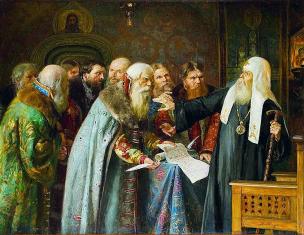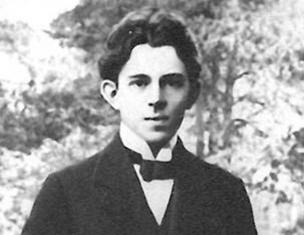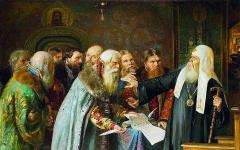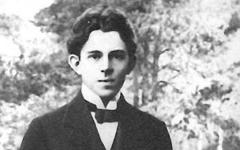For an artist, the surrounding life is not only a source of inspiration and a subject of aesthetic interest. She scanned him moral sense, and she herself, in turn, conquering the artist, generates and strengthens this feeling in him. For Pasternak, the artist was always a “hostage”, but also a “debtor”, devoted to art to the end. The awareness of the specialness and chosenness of the poet’s fate also distinguishes the late Pasternak. It is multiplied by life experience, deepened by analysis and therefore truly impressive. It emphasizes and puts forward a moral aspect - the idea of the artist’s responsibility to the whole world, to art itself and directly to people.
The deep organic nature of the theme of duty and service is confirmed in Pasternak by the variety of options for its expression. It appears in the logic of cultural, historical and evangelical comparisons - in the poem “Hamlet”. Or it suddenly appears, on the crest of a free and broad lyrical wave, in “Earth.” Or - rather unusually - it acquired a melting character almost like a maxim in the poem “Being famous is ugly.”
The poem “Being Famous is Ugly” was written by a recognized master during the period of his “last songs.” It conveys the poet’s internal perception of his role, the very essence of his existence on earth.
Late Pasternak is academic. He spends sparingly artistic media, which are in his arsenal, but this does not make his poems drier, but only emphasizes the skill of the poet, faithful to his image of the world, different from what Soviet literature offered:
Being famous is not nice.
This is not what lifts you up.
No need to create an archive,
Shake over manuscripts.
In this poem, Pasternak contrasts his creative path with the path of Vladimir Mayakovsky, immoderately glorified after he was declared by Stalin " the best poet modernity." Well, the leader needed a “court” poet who would carry the ideological guidelines of modernity to the masses, and by the will of fate, his choice fell on the famous futurist. But Pasternak was disgusted by the fate of the “famous” that befell Mayakovsky; he could not imagine life outside of secrecy and invisibility, and he always separated true poetry from near-literary vanity.
Let us note for now: it is contraindicated for a poet, as Pasternak believed, to be famous, to “keep archives”; success is detrimental to his talent
and hype. In addition, the public's love is fleeting, sometimes unfair, and often subject to fashion. The poet, of course, creates for people; this is precisely the essential meaning of any creative act. But precisely, for and in the name of the people, and not for the sake of their enthusiastic assessments, and especially not for the purpose of pleasing the tastes of those in power. Pasternak treats fame as a worldly vanity; his art is akin to the mercy of the celestials who give people benefits without demanding anything in return. The poet experiences joy from creativity itself. It is his element and way of existence. He cannot help but compose; for him it means to live, pouring out his soul in sounds, filling the world with beauty.
The poet formulates the maxim: “The goal of creativity is dedication.” In the first place for Pasternak is the highest sensitivity, responsiveness to moral impressions, and not the transformation of life into the life of a poet. Actually, in Pasternak’s later poems, with their lofty, preaching assertion of duty, a decisive activation of the “I” is visible, no longer so much an eyewitness to the world process, but rather its direct accomplice. And in the poem “Being Famous is Ugly,” this activation is taken to the limit. In the subtext of the poem there is the same desire for unity characteristic of Pasternak, but, being complicated by a feeling of incomprehension, the subjective moment in the poem is obvious - it expresses itself not directly, but indirectly, through conflict. All this introduces new accents into the artist’s philosophical and aesthetic concept, but does not destroy its foundation - the affirmation of unity with the world as a life-giving and morally formative principle.
In general, the poem requires thoughtful reading in the context of all of Pasternak’s lyrics, its thematic features, philosophical orientation, specific features. How dangerous it is to draw conclusions regarding the works of a great poet, how difficult it is to penetrate into his artistic world, is evidenced by Mandelstam’s arrogantly expressed opinion, according to which “It’s not beautiful to be famous” “sounds like an official report.” Mandelstam was wrong: what the poem does not have is “officiality”; rather, it creates the impression of a teaching message, but confidential, sincere, honest, like an intimate conversation between good friends.
Pasternak's signs attract attention colloquial speech: “to shake over manuscripts”, “to be a byword on everyone’s lips”, “in the end”, “not in sight”, “an inch away”. The poet uses phraseological units and colloquial expressions, which impart special expressiveness to speech with a small volume of words and convey conversational intonation.
There is another important aspect of interpreting the poem. Although the exceptional eight verses cannot be assigned to any specific place Holy Scripture, it should be noted that they, like the entire text, consist of biblical words. “It’s Ugly to Be Famous” is focused in content and poetics on the gospel apostolic epistles. Pasternak, a deeply religious man who fell into the trap of atheistic Russian literature Soviet period, nevertheless, remains true to his moral principles and religious beliefs and formulates those moral laws and ethical dogmas without which a true artist cannot imagine the life of a true artist.
Boris Leonidovich Pasternak is a poet-philosopher, a thoughtful artist who peers with interest at the life around him. The inquisitive mind of the poet wants to penetrate into the very essence of things, understand them and tell the world about his discoveries. In essence, the poet sums up his work with the poem “Being Famous is Ugly.” But summing up does not mean putting an end to it. The last book lyricism is not the end of Pasternak’s poetry, always looking to the future, tuned to the perception of its call:
Others on the trail
They will pass your path by an inch,
But defeat comes from victory
You don't have to differentiate yourself.
A true artist is always a pioneer. Others will follow him, perhaps without even remembering whose footsteps they are following. But can this have any significance for a poet who devotes himself entirely to creativity, without reserve, and in his self-giving is likened to Jesus Christ, performing the feat of the cross? Living like this is hard, sometimes unbearable, but such is the fate of a poet. Only then is a masterpiece of art born when the human soul is alive, when it is open to the world and people:
And should not a single slice
Don't give up on your face
But to be alive, alive and only,
Alive and only until the end.
This is how Pasternak’s poem ends, and his final book of lyrics is imbued with the same sentiments. This is his last - no, constant, everlasting and forever living - poetic word.
Pasternak - author interesting works, who wrote many wonderful essays and reflections on the topic of being, truth, time, he wrote about life and death, and philosophized on other topics. So, the theme of Pasternak’s poem “It’s Ugly to Be Famous” that we are studying is also philosophical.
Pasternak's poem Being famous is ugly
Pasternak’s poem “It’s Ugly to Be Famous” was written in 1956. This work belongs to the cycle of works “When it clears up” and can safely be called instructive. When you read a poem, in every line you hear the advice of the author, who wants writers to create their works not to become famous, not for the sake of hype and not for fame. He encourages you to write your works, giving meaning to what you write and what you write about, and if recognition and love from readers comes, then this should happen naturally, thanks to “dedication”, your work, but not “imposture”.
This work does not use such techniques as epithets, comparisons, there are no metaphors, but there are verbs, phrases, complex sentences, can be called a sermon. A sermon for those who decided to take up the pen. The poem makes you think. When you read Pasternak’s work, you understand what the essence of the work of writers should be and this is “not hype, not success.” Pasternak instructs all his contemporaries and future writers; he encourages them to live and write in such a way as to “attract to themselves the love of space.”
Working on the analysis of Pasternak’s poem “It’s not beautiful to be famous,” we can conclude that a real writer, a true poet will never distinguish between “defeats and victories” in his works; for him, all works are part of his soul, and if today someone’s work is not recognized, then through the centuries it can become a masterpiece. The main thing is to always “be alive”, write about the present and “not give up a single bit of your face.” Therefore, if you despise, write about it, if you love, write about it, know how to hate, know how to rejoice, but there is no need to depict something that does not really exist, something that someone wants, just to become famous.
Being famous is ugly to listen to
The creative path of Boris Pasternak was very difficult and extraordinary. Today he is rightfully considered one of the brightest Russian poets of the 20th century. However, his most famous works, including the novel Doctor Zhivago, which brought the author Nobel Prize, parsnip wrote in the era of the formation and development of the USSR. Naturally, in order to become a famous writer in a country with a totalitarian regime, it was necessary to have not only a bright and original talent, but also to be able to hide one’s true feelings both in public and in his works. Parsnips were never able to learn this, so they were periodically subjected to disgrace by the ruling elite. Nevertheless, he was popular, and his poems, novels and plays, which periodically disappeared from sale and were rejected by censorship, were published abroad and copied by hand. The author was really famous, but he was embarrassed to be recognized on the street and tried in every possible way to belittle his own contribution to literature. However, not all Soviet writers behaved this way. Many of them, not having even a hundredth part of Pasternak’s talent, considered themselves real geniuses and emphasized this in every possible way. Moreover, in those days it was not so much a literary gift that was valued as a loyal attitude to party politics.
Despite all his fame, he had few friends among the creative intelligentsia. The poet himself explained this by saying that he was unable to maintain warm and trusting relationships with hypocrites and careerists. Those who were treated kindly by the authorities could afford to live in luxury, although from the pages of newspapers they called on the people for equality and brotherhood. Therefore, in 1956, Parsnip wrote his famous poem, which he addressed to his colleagues in the literary workshop. After the publication of this work, which was included in the collection “When it clears up,” many famous poets and the writers simply stopped greeting Pasternak, believing that he addressed his rhyming message to them personally. In fact, the author created a kind of code of honor for a writer, talking about how he sees a real poet or writer. In his opinion, modern writers should not worry about their creative heritage, creating archives and “shaking over manuscripts.” Years will pass, and if these people were truly talented, then future generations of readers will appreciate it. If not, then carefully collected and sorted papers will forever gather dust in museum and library storerooms, unclaimed by anyone. The poet is convinced that “the goal of creativity is dedication, not hype, not success.” He calls on his colleagues to “live without imposture,” i.e. do not take credit for other people’s merits and do not try to look better in the eyes of others. According to Parsnip, life will put everything in its place anyway, and it will be much more important for posterity to know that the person whose works they admire was not a scoundrel. Therefore, the author is convinced that one must live in such a way as to “attract to oneself the love of space, to hear the call of the future.” In addition, the poet calls on fellow writers to “plunge into the unknown and hide your steps in it,” and not revel in power, money and prosperity, which predetermine fate and deprive a person of that spark in creativity, which is called talent.
He knows that history is created by people and interpreted by them to serve their own interests. Therefore, he is convinced that everything in this world is relative, and you should not revel in your achievements, which may be perceived completely differently after many years. The author believes that a real poet should not distinguish “defeats from victories,” because time will still judge everyone in its own way. And the only value that is for Pasternak absolute value, is the ability to “be alive” to the end, i.e. be able to sincerely love, despise and hate, and not portray these feelings to please someone in your works.
Analysis of the poem by Pasternak B.L. "It's not nice to be famous"
Poem by B.L. Pasternak’s “It’s Ugly to Be Famous” (1956) is one of the programmatic works in the poet’s work. Its plot consists of laconic formulas that accumulate the author’s views on the life of a creative person. The author simultaneously applies the principles expressed in the poem to both himself and other writers. B.L. Pasternak talks about the inner depth of the creative act, its self-purpose. Neither fame nor success in anyone's eyes is directly related to the quality of the works created. An artist of words can only decide in the depths of his soul whether the height to which he aspired has been achieved: “The goal of creativity is dedication, not hype, not success.” In the third stanza of the poem B.L. Pasternak emphasizes the special position creative person in time and space. At the same time, he formulates another principle, important and necessary for a human creator: “Hear the call of the future.” Only then will the poet be able to become interesting not only to his contemporary, but also to his descendants. However, in this stanza there is also a certain mystical motive of the sacrament; the artist needs to “attract the love of space to himself.” In fact, the motive will remain unclear until the end. The metaphor “love of space”, quite deep in its philosophical content, can symbolize good luck, a muse that brought creative insight, and favorable life circumstances (interesting meetings with people, nature). But still, the point here is not that he should realize his place in the world. In the fourth stanza, the author talks about the connection between life and creative path, in which the second turns out to be more important, more voluminous than the first, because it includes, absorbs it, “crossing it out in the margins.” Being a poet-philosopher, B.L. Pasternak encourages learning from nature. His lyrical hero is able, without fear of the future, to “plunge into the unknown,” just as an area hides in fog. B.L. Pasternak writes about the need for a talented person not to revel in victories, but to maintain personal modesty in relation to his successes. After all, the main thing is to lead other people, who will decide who in history will receive glory and who will be forgotten. B.L. Pasternak, by personal example, teaches not to prevaricate, not to become isolated in one’s experiences, to maintain a keen interest in the world around us, to love life until the very last hour. The theme of the purpose of the poet and poetry is deeply embedded in the Russian classical poetic tradition. In this regard, the poem by B.L. Pasternak’s “Being Famous is Ugly” creatively continues it. The poem is written in iambic tetrameter. All seven stanzas of it are connected by cross rhyme. At the same time, female and male rhymes alternate. The poem widely uses figurative and expressive means of language: phraseological units (“a parable on everyone’s lips”, “there are five behind a span”), antithesis (“defeats” - “victories”), as well as the technique of emphasizing the vertical coordinates of artistic space (“raises up “,” “plunge into the unknown”), this compositional technique goes back to Tyutchev’s poetic tradition and is characteristic of meditative lyrics in general. The main epithet is the epithet “living”, reinforced in the final stanza by a threefold repetition. So it's obvious. B.L. Pasternak sees the meaning of life in life itself, in living it honestly and openly. It is no coincidence that the words “should”, “must”, “must not” appear so often in the poem.What meaning did the poet put into the final lines of the poem?
Read the poem below and complete tasks B8-B12; SZ-S4.
| * * * It's not nice to be famous This is not what lifts you up. No need to create an archive, Shake over manuscripts. The goal of creativity is dedication, Not hype, not success. Shameful, meaningless Be the talk of everyone. But we must live without imposture, Live like this so that in the end Attract the love of space to you, Hear the call of the future. And you have to leave spaces In fate, and not among papers, Places and chapters of a whole life Marking in the margins. And plunge into the unknown And hide your steps in it, How the area hides in the fog, When you can't see a thing in it. Others on the trail They will pass your path by an inch, But defeat comes from victory You don't have to differentiate yourself. And should not a single slice Don't give up on your face But to be alive, alive and only, Alive and only until the end. |
B. L. Pasternak, 1956
“Being famous is ugly,” “The purpose of creativity is dedication.” What are such laconic sayings called, containing philosophical or worldly wisdom, an instructive conclusion? Give your answer in the singular.
Explanation.
Such sayings are called aphorisms or catchphrases. An aphorism is an original complete thought, expressed or written down in a laconic, memorable text form and subsequently repeatedly reproduced by other people.
Answer: aphorism.
Answer: aphorism|catchphrase
Alexander Rybakov 27.04.2016 22:09
Excuse me, but why is the answer “aphorisms” not correct? After all, the question was asked in plural: “What are the...sayings called...? Then it is necessary to indicate in the task that the answer is in the Nominal case.
Tatiana Statsenko
The assignment clearly states: “write your answer in the singular.”
Name the stylistic figure associated with the repetition of a word at the beginning of poetic lines:
And plunge into the unknown, And hide your steps in it...
Explanation.
This stylistic figure is called anaphora or unity of command. Anaphora or unity of principle is a stylistic figure consisting of the repetition of similar sounds, words or groups of words at the beginning of each parallel series, that is, the repetition of the initial parts of two or more relatively independent segments of speech (hemistymes, verses, stanzas or prose passages).
Answer: anaphora or unity of command.
Answer: anaphora
What is the name of the technique used by the poet in the fifth stanza of the poem (“And hide your steps in it, / How the area hides in the fog...»)?
Explanation.
This technique is called comparison. Let's give a definition.
Comparison is the bringing together of two objects or phenomena with the aim of explaining one of them with the help of the other; a figurative allegory that establishes similarities between two life phenomena.
Answer: comparison.
Answer: comparison
Indicate the term that denotes a trope based on the transfer of the properties of some objects and phenomena to others (“love of space”, “call of the future”).
Explanation.
This term is called metaphor. Let's give a definition.
Metaphor is the transfer of the properties of one object or phenomenon to another based on the principle of their similarity, a hidden comparison.
Answer: metaphor.
Answer: metaphor
What is the name of a stylistic device that enhances the sound expressiveness of a verse and is associated with the use of identical consonant sounds (“They will pass your path by an inch”)?
Explanation.
This technique is called alliteration. Let's give a definition.
Alliteration is the repetition of identical or homogeneous consonants in a poem, giving it a special sound expressiveness.
Answer: alliteration.
Answer: alliteration
Tatiana Abrams 28.01.2017 23:21
When solving printed collections, the answer was simply “sound writing”, since this concept already implies repetition of any sounds.
Tatiana Statsenko
If collections allow such answers, it does them no credit. If the task clearly states “identical CONSONANT sounds,” then the answer should be unambiguous - “alliteration.”
Which Russian poets addressed the topic of creativity and in what ways are their works consonant with the poem by B. L. Pasternak?
Explanation.
Our contemporary E. Yevtushenko said: “A poet in Russia is more than a poet,” - these lines perfectly define the essence poetic creativity. For a real poet, life and creative credo are synonymous. Marina Tsvetaeva, in the poem “I am happy to live exemplary and simple,” sees her happiness in “living the way I write: exemplary and concise.” Her predecessor N.A. Nekrasov considered it his duty to be a poet-citizen and to benefit people with his creativity and serve the Motherland. A true poet for N. A. Nekrasov cannot exist without a close connection with events public life. Lines from the poem “The Poet and the Citizen”:
It’s even more shameful in a time of grief
The beauty of the valleys, skies and sea
And sing of sweet affection... -
become the poetic credo of N. A. Nekrasov.
B. Pasternak in the poem “Being Famous is Ugly” proclaims his purpose:
The goal of creativity is dedication,
Not hype, not success.
Shameful, meaningless
Be the talk of everyone.
Explanation.
In 1956, Pasternak wrote his famous poem “It’s Ugly to Be Famous,” which he addressed to his literary colleagues. The poem became a kind of code of honor for a true writer. Discussing the purpose of creativity, in the last quatrain the author comes to the conclusion that a poet or writer should
...to be alive, alive and nothing more,
Alive and only until the end.
The only value that is an absolute value for Pasternak is the opportunity to “be alive” to the end, i.e. be able to sincerely love, despise and hate, and not portray these feelings to please someone in your works. A poet should not deviate from his calling - to seek the truth and bring it to people.







